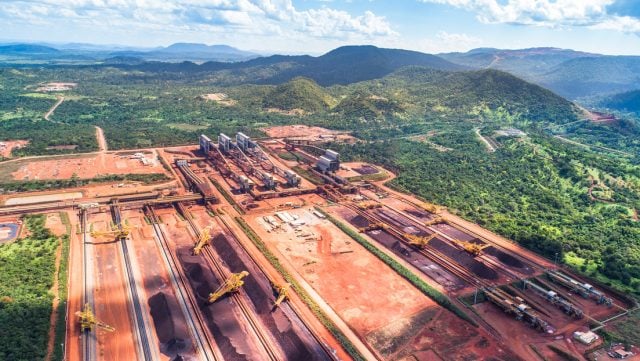Mining giants like Vale or Anglo American, financed by international and national investors, continue to destroy the Amazon and contribute to violating the rights of indigenous peoples. They do so, according to a report published this Tuesday, despite committing to abandon their interests in protected indigenous lands and thanks to the «momentum» of this activity in the Government of Jair Bolsonaro.
The report ‘Complicity in Destruction IV: How mining companies and international investors contribute to the violation of indigenous rights and threaten the future of the Amazon’ denounces the practically null validity of the announcements of these multinationals, because thousands of requests for mining exploration and exploitation on indigenous lands are still active in the database of the National Mining Agency (ANM).
In 2021, for example, Vale and Anglo American announced that they would give up their applications. However, in November of that year, they led the number of active mining orders, explains the journalist Marta Miera in a report for RT.
The study, launched by Amazon Watch and the Articulation of Indigenous Peoples of Brazil (Apib), registered 2,500 active requests «overlapping» 261 indigenous lands from 570 companies, associations and cooperatives, covering an area practically as large as the United Kingdom (10 .1 million hectares). Almost half is for gold prospecting.
“The damage to the environment and to the lives of peoples because of mining is brutal and has gotten much worse with the Bolsonaro government. Last year, deforestation linked to mining in the Amazon increased by 62% compared to 2018, the year in which he was elected», warns Ana Paula Vargas, director of the Amazon Watch Brazil program.
One of the main instruments that drive these giants are bills such as the 191/2020 or 490/2004, which freed mining – an activity that made decisive progress after the military dictatorship (1964-1985) – within indigenous lands. The first one alone could cause the loss of 16 million hectares and put the lives of dozens of indigenous and traditional peoples at risk.
In addition to destroying the jungle –13,235 square kilometers felled between August 2020 and July 2021–, mining also contaminates rivers with mercury and causes serious health problems for indigenous people.
Despite strong criticism, since the beginning of his mandate, the expansion of agribusiness and mining in the ‘planet’s lung’ has been at the center of Bolsonaro’s agenda. «The garimpo is a vice, it’s in the blood», said the president once, whose father, Percy Geraldo Bolsonaro, was a ‘garimpeiro (miner)’ in the 1980s in Serra Pelada, in Pará, considered one of the largest open pit mines in the world.
Last week, Bolsonaro’s latest move was to launch a controversial decree to support «artisanal mining», which is legal but insignificant compared to these illegal activities that have intensified exponentially with the pandemic, which has already hit indigenous populations hard, who are much more vulnerable to the virus.
«More than ever, we need the commitment, in addition to the Brazilian government, companies in the sector, their investors and the international community to prevent the destruction of the Amazon and the attacks on the rights of indigenous peoples», says Vargas.
Large mining companies in the Amazon
The investigation analyzes the interests of nine large mining companies on indigenous lands since 2020: Vale, Anglo American, Belo Sun, Potasio de Brasil, Mineração Taboca/Mamoré Mineração e Metalúrgica, Glencore, AngloGold Ashanti and Rio Tinto. In total, in the last five years, they received 54.1 billion dollars in financing from Brazil and abroad. In November 2021, there were 225 mining applications that coincide in 34 indigenous territories, an area that corresponds to 572,738 hectares.
Vale leads the number of requests, with 75 active, followed by Anglo American, with 65. The state of Pará is where the highest concentration of requests is registered, 143, followed by Amazonas, with 56, and Mato Grosso, with 23.
The most affected indigenous territories are Xikrin do Rio Catete, in Pará, and Waimiri Atroari, in the state of Amazonas, with 34 requests each. Five requests are in areas where indigenous people from the Apiaká people live in voluntary isolation.
Global funding bodies
Among its main financiers are companies based in the US, such as Capital Group, BlackRock and Vanguard, which invested 14.8 billion dollars in mining companies with interests in indigenous lands, or Brazilians such as the Previ pension fund, which invested 7.4 billion dollars, and the Bradesco bank, the second largest private institution in Brazil, which contributed 4.4 billion dollars.
There are also international private banks such as Crédit Agricole (France), Bank of America and Citigroup (US), Commerzbank (Germany) or SMBC Group (Japan) or the Royal Bank of Canada (Canada).
The company that received the most investments and loans was Vale, with 35.8 billion dollars. This reflects – according to the report – that the human and environmental tragedies caused by the breaking of the dams in Mariana, in 2015, and three years later in Brumadinho -both owned by Vale– «have not diminished the appetite of investors».
“It is necessary to understand in a general way that these areas are not available for mining exploration, nor should they be, both due to respect for the constitutional right of self-determination of indigenous peoples over their territories, and due to their importance in combating climate change and guaranteeing life on the planet», says Dinaman Tuxá, a member of Apib’s executive coordination.


